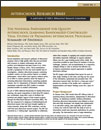The National Partnership for Quality Afterschool Learning Randomized Controlled Trial Studies of Promising Afterschool Programs: Summary of Findings

Authors: Michael Vaden-Kiernan, Debra Hughes Jones, Zena Rudo, Robert Fitzgerald and Ardice Hartry, MPR Associates, Inc., Bette Chambers and Dewi Smith, Success for All Foundation, Patricia Muller and Marcey A. Moss, The Center for Evaluation and Education Policy (CEEP) at Indiana University
| Price: Available free online |
Available online: PDF
![]()
Recent evaluations and research syntheses of afterschool programs rated as high quality show they are associated with increases in student achievement and other positive socio-behavioral outcomes (Lauer et al., 2006; Vandell, Reisner, & Pierce, 2007). Those examinations provide a springboard for the next much-needed area of investigation—whether afterschool programs containing academic content can have positive impacts on student achievement—about which scant rigorous evidence exists. In an effort to answer questions about the impact of promising afterschool interventions containing academic content, the U.S. Department of Education funded three randomized controlled trial (RCT) studies to evaluate potential benefits on student achievement.
As part of SEDL’s National Partnership for Quality Afterschool Learning, the award competition to fund three RCT projects was coordinated, along with a plan to facilitate the technical and analytic support of the research projects through the Afterschool Research Consortium (ARC). The ARC was composed of a subgroup of methodological and afterschool experts that had been brought together to review proposals, along with SEDL researchers, and key staff from each afterschool research project. The ARC was conceived as a “cutting-edge” opportunity to collaborate, rather than compete, in applying best research practices and address important challenges to support awardees’ efforts over the 2-year funding period (2006–2008). The consortium provided an open forum for members to discuss challenges, solutions, and accomplishments in a supportive, collegial setting in order to advance the effective use of rigorous experimental research approaches in applied afterschool settings.
The RCT project staff submitted final reports for each of their study’s findings in Fall 2008, and they are the source of the information synthesized and presented here. This afterschool research brief, the final in a three-part series, presents an overview of the studies and a summary of implementation and impact findings across the 2 years of funding.
The full series of briefs includes:
As part of SEDL’s National Partnership for Quality Afterschool Learning, the award competition to fund three RCT projects was coordinated, along with a plan to facilitate the technical and analytic support of the research projects through the Afterschool Research Consortium (ARC). The ARC was composed of a subgroup of methodological and afterschool experts that had been brought together to review proposals, along with SEDL researchers, and key staff from each afterschool research project. The ARC was conceived as a “cutting-edge” opportunity to collaborate, rather than compete, in applying best research practices and address important challenges to support awardees’ efforts over the 2-year funding period (2006–2008). The consortium provided an open forum for members to discuss challenges, solutions, and accomplishments in a supportive, collegial setting in order to advance the effective use of rigorous experimental research approaches in applied afterschool settings.
The RCT project staff submitted final reports for each of their study’s findings in Fall 2008, and they are the source of the information synthesized and presented here. This afterschool research brief, the final in a three-part series, presents an overview of the studies and a summary of implementation and impact findings across the 2 years of funding.
The full series of briefs includes:
- Implementing Randomized Controlled Trial Studies in Afterschool Settings: The State of the Field
- Key Issues and Strategies for Recruitment and Implementation in Large-Scale Randomized Controlled Trial Studies in Afterschool Settings
- The National Partnership for Quality Afterschool Learning Randomized Controlled Trial Studies of Promising Afterschool Programs: Summary of Findings
